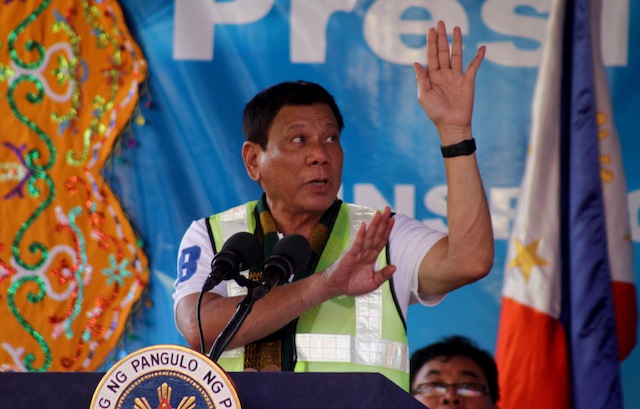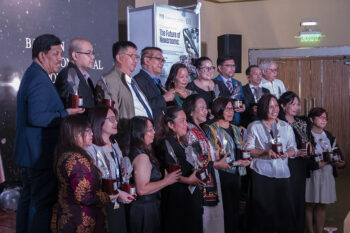BULUAN, Maguindanao (MindaNews / 23 July) – President Rodrigo Duterte wants the enabling law for the future Bangsamoro political entity passed and implemented “bukas kaagad” (literally: immediately, tomorrow), but minus the provisions where constitutionality issues are being raised.
“Then maybe someday, if we go federal, eh yun na idagdag, ibalik doon sa Constitution ng federal, ibalik na natin yung .. ayaw ng gobyerno tapos yung gusto ninyo (let’s add those, lets’ incorporate them into the Federal Constitution, let’s restore what government does not like but what you like (into the new Constitution), Duterte told Maguindanao officials, plantation workers and a few representatives of the Moro Islamic Liberation Front (MILF) after inspecting a biomass power plant project inside an oil palm plantation here Friday afternoon.
 President Rodrigo Duterte tells his audience in Buluan, Maguindanao on Friday, July 22, 2016 that he wants the Bnagsamoro law passd and implemented “bukas kaagad” minus the provisions where issues of constitutionality would be raised. MindaNews photo by KEITH BACONGCO
President Rodrigo Duterte tells his audience in Buluan, Maguindanao on Friday, July 22, 2016 that he wants the Bnagsamoro law passd and implemented “bukas kaagad” minus the provisions where issues of constitutionality would be raised. MindaNews photo by KEITH BACONGCO
Duterte’s announcement was greeted by applause. But for those actively involved in the 19-year old peace process, it raised fears that a “BLBAR-like” law might be passed by the 17th Congress.
To recall, the proposed Bangsamoro Basic Law (BBL) that the 15-member GPH-MILF Bangsamoro Transition Commission (BTC) drafted and submitted to Congress on September 10, 2014 was “watered down” by the Senate and House of Representatives with their respective versions of a proposed “Basic Law for the Bangsamoro Autonomous Region” (BLBAR).
The versions were unacceptable to the MILF and various peace groups, noting that these would render the future Bangsamoro less autonomous than the Autonomous Region in Muslim Mindanao (ARMM) that it seeks to replace.
Guiamel Alim, Executive Director of the Kadtuntaya Foundation and a member of the Council of Elders of the Consortium of Bangsamoro Civil Society (CBCS) said “let the SC rule on the issue of Constitutionality first so that the convergence effort can be guided. The deleted provisions can be returned in the federal structure.”
Alim also asked: “what if the deleted provisions will not be accommodated in the federal structure, assuming they are unconstitutional today? Then we will have a BLBAR in the new Constitution forever.”
“Simultaneous”
Duterte on July 18 approved the peace roadmap presented by Presidential Adviser on the Peace Process Jesus Dureza. Under this roadmap, work on the new proposed Bangsamoro enabling law “will be done simultaneous with the moves to shift to a federal set-up, the latter expected to come later under the planned timeline.”
The 15-member, MILF-led BTC, which will be reconstituted to allow for a more inclusive representation from among the seven nominees of the government, will be tasked to “draft anew a more inclusive proposed enabling law that will be filed with Congress” in lieu of the BBL that the previous Congress failed to pass. The BBL will also propose amendments to the Constitution.
MILF chair Al Haj Murad Ebrahim told MindaNews last month that the draft BBL submitted to Congress in 2014 will be “improved” through a convergence of the provisions of the 2014 CAB and the 1996 Final Peace Agreement (FPA) with the Moro National Liberation Front (MNLF) through the Bangsamoro Coordination Forum (BCF) before it is presented to the 17th Congress.
The 57-nation Organization of Islamic Cooperation (OIC) initiated the establishment of the BCF in 2010 to “harmonize the two peace tracks.” The OIC Secretary-General even visited Davao City in April last year and met with the MILF and MNLF, separately and together, to strengthen the harmonization.
A day before Duterte visited Buluan, Presidential Adviser on the Peace Process Jesus Dureza met with MILF chair Murad in Camp Darapanan in Sultan Kudarat, Maguindanao, where they agreed on a 10-member GPH-MILF Implementing Team – five from the government and five from the MILF.
The team will discuss their joint peace roadmap in accordance with the 2014 CAB and in convergence with the 1996 FPA, and with other sectors, for what would be a broader, more inclusive Bangsamoro Peace roadmap.
Dureza’s visit to the MILF camp came three days after Duterte approved the peace roadmap he presented in a meeting in Malacanang . The roadmap provides that work on the new proposed Bangsamoro enabling law “will be done simultaneous with the moves to shift to a federal set-up, the latter expected to come later under the planned timeline.”
Dureza and Murad also agreed that the Team would meet in Kuala Lumpur in early August.
Approach with cautious optimism
Lawyer Naguib Sinarimbo of the Bangsamoro Study Group said the members of the new BTC “should ideally be knowledgeable about constitutional law and the rules of statutory construction and thereafter Congress will also have to determine what is constitutional within the existing legal framework.”
“All of these are preliminary and based on their most enlightened judgment since in the end, and in accordance with the delineation of powers set by our Constitution, it is the Supreme Court which is the final arbiter of what is constitutional. What is key is that in the determination of what is constitutional, the laws, in this case the BBL if it passes Congress, enjoys the presumption of constitutionality,” Sinarimbo said.
He appealed to these institutions to “take a more liberal interpretation” of the Constitution so as not to frustrate the intention of the parties when they entered into a peace agreement.
“We are not just dealing here with ordinary contracts, we are dealing here with a peace agreement the forging of which had both seen lives being saved and lost. Let us therefore interpret the Constitution, not by its letter that killeth but by its spirit that giveth life into a peace agreement,” he said.
“We should approach it with cautious optimism as we could end up with a BLBAR or get stuck again in Congress like before. We must proceed with the President’s road map, conscious of the urgency of passing an enabling law without losing sight that the peace agreement is about changing the status quo,” said Sinarimbo, who was ARMM Executive Secretary from December 2009 to December 2011 and who later served as lawyer and member of the technical working group of the MILF peace panel
For lawyer Benedito Bacani, Executive Director of the Institute of Autonomy and Governance (IAG), his advice is “just monitor the concrete steps of the Implementation Team,” (Carolyn O. Arguillas / MindaNews)
